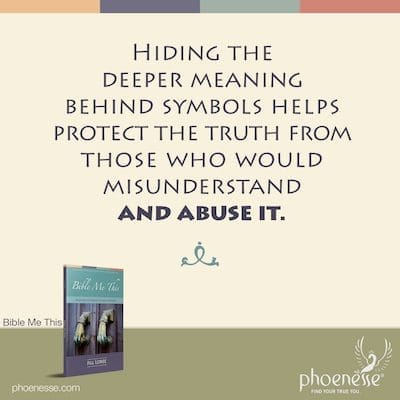Back in the day of Christ, spiritual truths were kept safeguarded away in Mystery Schools. That was done so the masses couldn’t get at them and make a mess of them. And in fact, this does seem to be what happens in current times when people attempt to read and interpret the Bible without the benefit of a clean lens. It seems riddled with contradictions and shrouded in mystery. Turns out, that was intentional. So much for avoiding a mess.

Consider that the New Testament is a collection of accounts from people who were called, at the time, disciples and apostles. These typically do confirm events without contradiction. And they are indeed confirmations of real historical events, not fabrications as some sources may claim today.
Among the disciples who were with Jesus, some have completed their work in the cycles of incarnation. They are highly developed spirits now who continue to have great tasks to fulfill in helping out here on Earth. Others are still walking among us. But knowing which are which is not relevant to our own tasks and personal growth.
In writing the Bible, as happens whenever a group of people get together, everyone sees things from a slightly different vantage point. Consider the way no two journalists covering a story write exactly the same article. People tend to tune into different things and have different opinions about what’s relevant. Plus, in the case of the Bible, not all the witnesses attended all the same parties. So some Gospels focus more on some events than others.
It may also appear that many of Jesus’ directives would be, in today’s world, contradictory to spiritual laws as we are taught them. Even factoring in the occasional mistranslation, which are caused by the translator’s own limited scope and misconceptions, the laws back then were intentionally designed keep less savvy people out of religious business. We’ve come a long way since then, baby, at least in some ways. And those rules and laws aren’t needed today to keep us in check.
Another difference between then and now is that we weren’t capable of much introspection back then. Reality was separate from us and seen outside of us. Nothing was internalized. Cause and effect, then, could only be seen in a distorted way, as an arbitrary act from a punishing God, apart from ourselves.
As time has rolled forward, our outlook and perceptions about reality and all of creation have evolved. This gives us an immeasurable benefit in trying to understand the Bible. Wearing our improved glasses, we can see things in a new light, with new insight. We can better absorb the immense love that Jesus gave to all of humanity. We can experience him in greater alignment with reality. And this can help us in our efforts to make contact with him now.
Further, we can connect these teachings from the Guide in this respect, with actual historical events. This can aid us in opening to a deeper sense of God’s abiding presence in each of our lives and for all of humanity. This revelation of the ongoing process of evolution will strengthen our faith and help us to correct our distortions.
When it comes to taking in any aspect of the Bible, including the Old as well as the New Testament, it can be interpreted on many levels. The lowest level is the historical level. From this perspective, there are many errors and omissions, which one would expect. Next there is the spiritual and symbolic level, or what we might call the metaphysical level. And lastly is the psychological level. This may be the most useful for people today in our current state of development.
This last level is present regarding everything mentioned in Holy Scriptures. And reading meaning on one level doesn’t cancel the others out. So people, for example, many of whom really lived on Earth—not all, but many—also then represent psychological aspects. It is the simultaneous existence of the many different levels that makes the Bible such a magnificently unique and outstanding document.
So we can search for meaning on each of these planes. That’s when we will discover how inconceivably artful Holy Scripture is in the way it has been constructed. We can’t fully comprehend how strongly and resourcefully the Spirit World of God worked on this. They helped create this marvel, even as they could foresee how human errors would inevitably slip in over time.
Even with its flubs, the Bible has no equal. There are few people indeed who really get this and who get the meaning that exists on all these levels. Many perceive one level and perhaps even two. But there’s hardly a soul on Earth who can grasp them all.
Yet, when it comes to the great existential questions about creation, we are best served to have the right attitude and not get tangled up in believing we have to have the right answers. We can wait with humility for knowledge to become accessible to us, when we have progressed enough to deserve knowing it. As it says in the Bible, “Test everything and keep the good”. We want to learn to quietly accept whatever serves God’s will. We can don an accepting and patient attitude, without clamoring to know everything at once.
This opening-up process, which we are all in, is a gradual one. As we develop, more will be revealed to us. For example, we often have a certain way of perceiving the human being as being primarily our bodies. And in truth, when we incarnate, the physical aspects of our beings correspond to the parental genes, which affect the physical shell.
At the same time, the soul of the being about to be born is growing inside the mother’s body in such a way that its physical karmic necessities can come about. Nothing is happening by coincidence. Nothing is left on its own. In the Bible, when it says that God has counted every single hair on our heads, believe it. This is not an exaggeration. For even the smallest details are important and have meaning—much deeper meaning and significance than we can possibly imagine.

As we come to see this, we may realize that we are backwards in the way we think of symbolism. Our bodies are symbols, in one way or another, of our spiritual development and psychological trends. It’s not the other way around. But be careful here, we don’t want to generalize and say this means this and that means that. There are no rules that apply in that way.
It seems that everything could have been a lot easier if the Bible had been written so that it is easier for people to understand. And just as importantly, so we don’t misunderstand. This is really the whole nut about the Bible. For as long as we haven’t done the work of self-knowing so that on our own inner layers we are sufficiently developed, there’s absolutely no way for us to understand a deeper spiritual meaning—whether it’s clearly spelled out for us or not.
One would think, in fact, that if something is just expressed clearly enough, we could rule out any chance for misunderstanding. Wrong-o. Truth is, the more direct the explanation, the more dangerous it is for those who haven’t yet reached a higher level through their own personal development.
Even the words spoken here cannot possibly be understood by those who are still a ways off from this way of thinking. And we’ve come a good long ways since the days of Christ. The little that might make sense would end up having a worse effect than if they hadn’t read any of this at all. Such a person would be bound to misunderstand—which is a whole different animal from not understanding—and abuse would then follow.
In short, great truth cannot be revealed to one who is not yet ready to understand truth. For them, simple explanations will get twisted around as readily as concealed ones. For those who are ready though, the concealed meaning hidden in symbols will have additional meanings and revelations that can’t be found in simple statements.
Most people today can receive more direct messages of truth than the masses could understand a few thousand years ago. The words can be less veiled. But still, misunderstanding is part of the process. It’s a risk that has to be taken, with the amount revealed being carefully weighed to get the right dosage or proportion. It can happen that too much truth has a worse effect and leads to more harm than good. Like overdosing on the right medication. Then misunderstood truth will lead to half-truths that can really be lethal.
This has happened in the past, is happening now, and will continue to happen in the future. It can’t be avoided. But the benefit to those who derive real understanding from revealed truth will balance things out. So the risk must always be weighed. Hiding the deeper meanings behind symbols helps to mitigate the risk. The symbols protect the truth from those who would misunderstand and abuse it. They only reveal the truth to those who are ready to receive it.
But let’s face it, no one is fully free and clear in all areas of their being. This includes those tasked with passing on and translating these messages, who have misquoted, misunderstood or distorted the original meaning. Everyone who did this, did so in a different respect. But this didn’t happen because the truth was presented by way of symbols and parables. It happened because the person’s understanding was lacking. It would have been way worse if the truth had been presented directly.
Truth, people, can be a dangerous weapon. Even the truths presented here can have such a result. If we avoid applying these teachings personally in the deepest possible way, we’ll use them as a way to judge others. The danger in doing this is that it may partly be true. Without recognizing how these same negative tendencies live in each of us—including ourselves—we can turn our spotlight on others’ negative tendencies and conveniently avoid looking within. With such acute perceptions, we can blow everything that others do out of proportion, and ignore the factors in us that would change the overall view.
With such an outlook, people can become very arrogant. We can wrongly judge others, even when what we see is correct. Then others will react to these teachings of truth with a heightened negative outlook, especially if they are not searching within themselves for what is most painful—for what makes them cringe—so they can learn from it.
Truth must be handled with care. We must be responsible in how we hold these teachings. If we realize that someone is inwardly ignorant, it is better to not try to feed them the truth, but leave them rather in their outer ignorance. As Jesus himself stated, “For the letter killeth, but the spirit giveth life.” More and more, we will come to see that this holds true.
In the Bible, in the story about Job, we are told that he suffered greatly. This was connected to his shortcoming of self-deception and his lack of self-recognition, which stemmed from his pride and fear. He was impatient to already be perfect, which is a spiritual pride. Rather than using his desire for good to face himself with courage and sincerity, he used it to suppress his basic instincts using his tremendous self-will. He wanted to already be at a point one can only reach by way of hard work and the humility that comes with self-recognition.
So in the realm of spiritual development, where we are tasked with overcoming our primary faults of fear, pride and self-will, we all have a job to do. And we shouldn’t go about it the way Job did. Any symbolism there, per chance?
It is these inner flaws, which we each carry into this world for healing, that create an inner environment that’s not compatible with God’s world. But we get so involved in our inner wrong conclusions that we have an irrational impression about the way things really are. As a result, we have an image about life that is off-target.
This is the source of the commandment to not create an image of God. It’s not about drawing a picture or making a statue. It’s about having this off-base perception. We each are prone to this since, as children, our demanding little wills for 100% love and immediate gratification create conflict at an early age. So right from the start, we are at odds with authority. And who’s the highest authority of them all? God.
So it’s not a surprise that children project their subjective experiences with authority onto their imaginings about God. And ta-da, an image is formed. So as adults, whatever our relationship to authority is—which stems directly from our earlier experiences—that will be our attitude towards God—our God-image. It’s going to color and influence it.
The word “fear” arises when we read about God in the Scripture. It says things like “the fear of the Lord is the beginning of wisdom.” It’s also in the Zohar, the Jewish mystical teaching of Kabbalah, comparing “love and fear of God to the wings of the bird.”
In fact, there is a fear that can arise if we are in danger. This kind of fear is healthy. It’s like a signal telling us to do something to save ourselves from harm. This kind of fear is constructive rather than destructive. Without it, we would be destroyed. This is night-and-day different from the kind of unhealthy psychological fear that is destructive and which we are generally speaking of in our spiritual healing work.
Fear of God, on the other hand, has absolutely nothing to do with healthy protective fear. All references to fear of God in Scripture are a result of wrong translations that happened on a superficial level. But there’s also a deeper reason for such wrong translations. They have to do with this God-image we talked about, as well as with our fear of the unknown.
On one hand, we want a strong authority who will uphold fixed rules because then we don’t have to be responsible for ourselves. On the other hand, this generates an unhealthy fear. This in fact always happens when we don’t reach maturity and take on self-responsibility. Whether our fear is of ourselves, other people, life or an avenging God, it’s all the same.
So we can see that there is, outwardly, a simple misunderstanding about certain terms as they are used in the Bible. In this case, the word “fear” means something quite different. It can perhaps best be described as “honor” or “respect.” The respect we might pay to the highest intelligence, love and wisdom there is, is beyond words. In the face of such wonder, and in the presence of such enormous, unbounded greatness, one could not help but be in awe. It surpasses all understanding. But we would not be in fear. This idea, however, is what got conveyed in the erroneously translated word “fear.” But it wasn’t meant that way.
Looking at the Kabbalistic teachings pertaining to the word “fear,” the Hebrew word is Y(I)R(A)H. This word ties in with the ninth of the ten sephirot, which is the foundation—the turning point where involution ends and evolution begins. Here is the start of the upward turn toward God. So the awareness of God is the beginning of wisdom.
Another reaction-creating word is “righteousness.” In Scripture, it refers to doing the right thing and being good. Today, when we hear this word, we tend to think of self-righteousness in a moralizing sort of way. This reaction isn’t so off base, given that being self-righteous so often comes from a wrong attitude. It’s another way to refer to a false goodness—a forceful and insincere kind of goodness—that produces the moralizing approach people rebel against. Genuine goodness that comes from real growth never has this kind of effect on others.
Every teaching has the potential to invoke fear if it is misapplied and misunderstood. Just pronouncing a rigid commandment without offering the accompanying explanation for how to find the underlying obstruction that prevents following it, will do nothing more than produce fear and guilt, which will lead to hate.
In this day in age, it isn’t even constructive for us to merely obey a commandment. Because our final authority lives inside of us, not outside. And since it isn’t good enough to just do as we are told, our inner selves will be fearful even if our actions are perfectly correct and we are in compliance with the commandment. There’s a huge distinction between living the productive life that our real selves want us to lead, and us hopping to the demands of the perfectionistic ideal version of ourselves we attempt to create.
Our work is to overcome all these negative aspects of ourselves, including our unhealthy fears. In the Bible, the conquest of fear in Matthew is done by way of faith in God. But a genuine, secure, profound faith in God can only exist if we first have faith in ourselves. To the same degree that we lack faith in ourselves, we will lack faith in God.
If we have a need to cling to a loving authority, we will generate a superimposed faith in God and kid ourselves that it’s for real. But it can’t be true faith if we haven’t developed the maturity to have faith in ourselves. But how can we have faith in ourselves if we don’t understand what makes us tick? If we’re puzzled by what we do and we grope in the dark about what effect we have on others, and can’t fathom why life and others affect us the way they do, we are ignoring some vital parts of our make-up.
Such ignorance results from not being willing to discover the truth. Often we are even blind to our own unwillingness. If we overcome our hidden resistance, we will better understand ourselves and have more and more faith in ourselves—and therefore also in God. That’s the only way we can go about conquering our fear.
We each have grace as part of our true state of being. It is through this grace that all goodness and the powers of the universe, in the most abundant of ways, belong to each and every one of us. Falling from grace, then, means nothing more than not knowing this. When we ignore this fact, we search for solutions and salvation in faraway corners, while the truth of who we are hides inside us the whole time.
What we fail to see is this: it’s all ours for the asking. We don’t have to beg. We don’t even have to struggle. All we’re struggling against is our own blindness and our own distortions. They are what make us unhappy and afraid of finding the truth. And that’s what makes us cling to staying in untruth and unhappiness. And so we fall from grace. We need to clear this up in our own minds so we can save ourselves from further missteps.
As long as we are deeply involved in our own separation—trapped in a dualistic way of seeing the world—we can’t grasp the concept of unity and the reality that everything is inside of us. So this means that all good is inside of humankind. And by extension then, that means that all the bad that befalls us seemingly from the outside is also inside us.
The more healing work we do on our spiritual path, the more this will make sense to us. We’ll discover that what disturbs us is always, in the end, just a reflection of something going on inside us. And yet, even if we’ve done a lot of work, we are forever forgetting this. And then we ascribe miserable events to some factor other than ourselves—to something wrong outside ourselves.
The truth is, nothing can ever disturb us—no matter how much it seems like it’s the other guy’s fault—other than what’s inside us. The power is inside us to activate what gets reflected outside ourselves, whether it is unenjoyable or pleasurable. It’s our inability to understand this that makes us feel so darned separate—from life, from events, from the universe. The more we develop, the less we are tempted to keep doing this. That’s how we return to grace.
Return to Bible Me This Contents



